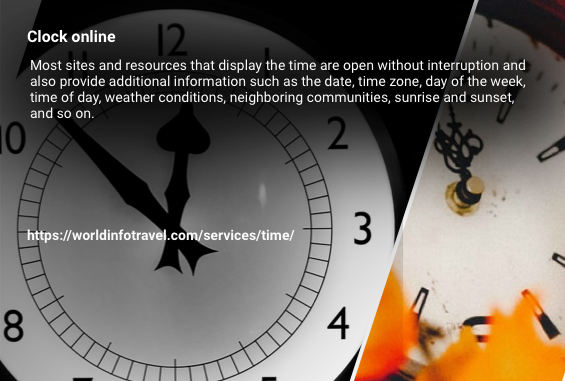What time is it. Find out the exact time now in your city
Your region is determined as Illesheim, Germany
Determine my location again
Now Central European Time (CET), offset UTC +01:00,
Central European Summer Time (Cf. HAEC) (CEST) standard time zone, UTC+02:00 will start from Sunday 27 March 2022, 03:00
Time on your computer: Loading....
The exact time of WorldInfoTravel is Loading.... The offset is ± Loading... ms.
The sun comes up
Summer and winter time
Online Clock
Stay tuned with worldinfotravel.com, the exact time services that delivers the most precise current time accurate to second and millisecond depending on user’s location.
About the Project
worldinfotravel.com is aimed at delivering the most accurate and stable time thanks to constant website synchronization with NTP-server. The platform generates precise time data with the minimum error of only ±0.001 per 24 hours.
Using our exact time website, you will have a chance to compare various time zones from across the globe as well as find out the exact time from 8000 cities worldwide available in 2 languages.
Determine the exact time not only in cities and countries but also on continents:
- Local time in Africa — 57 countries;
- Local time in Antarctica — 4 regions;
- Local time in Asia — 51 countries;
- Local time in Europe — 53 countries;
- Local time in North America — 42 countries;
- Local time in Australia — 28 countries and islands;
- Local time in South America — 14 countries.
Apart from online clocks, WorldInfoTravel delivers all the insights about the sunrise and sunset, moonrise and moonset for your particular region. Moreover, you may benefit from the detailed data on daylight hours as well as notifications to set the clock on summer time.

What is an online clock?
An online clock is a virtual clock with seconds that shows internet users the current time and date. They can be found on the Internet or on modern electronic devices. Usually such clocks show the time online not only in your time zone. If you change your settings, you can find out the current exact time for free online around the world.
How to know what time it is
To use a virtual clock and see what time it is, you’ll need a minimum of effort. Just turn on your PC or phone and look at the screen. If your clock is wrong and nothing helps, connect to the internet and type the following query into your browser: The exact time is now online in Moscow. You can choose any city or country. After entering the query, you can find out the exact time with the seconds online and show this data to others. However, it is better to protect yourself from the error of the developers and check the figures on different virtual sites.
If you want to display the exact time on the full screen, you will have to go to the site and click on «Full Screen I» or «Full Screen II». The former will display the minutes, hours, and date in full screen, while the latter will only display the time.
Most sites and resources that display the time work continuously and provide additional information such as date, time zone, day of the week, time of day, weather conditions, neighboring communities, sunrise, sunset, and so on. The accurate time online is synchronized with the virtual server to ensure data reliability.
History of Precise Time
In the beginning, there were no clocks, computers or Internet. People simply oriented themselves to the stars, sunset, sunrise and other natural manifestations. Then, as a result of evolution, our ancestors (the Egyptians) created a sundial, measuring the shadow of the sun. But even this was not enough for them, because at night, their priests were engaged in rituals, and they needed a more accurate determination of time. Then they invented the water clock: a large vase with a hole in the bottom that measured time by drops. And this invention was in demand for a long time; no one tried to come up with something more efficient until the 13th century.
In medieval Europe, in the 1300s, the development of mechanical clocks solved the problem of many people, as they gained knowledge of the exact time. The first devices (mechanically based) were fifteen minutes behind, but thanks to the development of pendulum clocks in the late 16th century, the daily loss of time was 10 seconds. In the 18th century, the American Watch Co. produced the first compact spring clocks and mass-produced them, making it even easier to live according to a certain schedule.
And so, when everyone had a watch, people wondered what kind of watch would tell the time better, who would wear it, and how. In the 19th century, there were hundreds of variations of local time, each determined by large mechanisms that were placed in local courthouses and city halls. These devices, experts adjusted by the noon sun in each place individually. And while it was noon in Chicago, it was 11:40 in St. Louis and 12:18 in Detroit.
This was a serious problem for the developing railroad industry: Precise schedules had to be prepared for trains. Railroad stations set their clocks according to the Harvard College Star Observatories. To solve the problem between local and railroad time, in 1883 the organizations controlling train traffic divided America into 4 time zones, and gave the residents of each area a choice: accept or refuse many options. Eventually, everything was synchronized.
In the 20th century, scientists created clocks tuned to the vibrations of crystals and even certain atoms, making it possible to tell time in fairly tiny units. Therefore, people have the same time on their clocks and live according to a set schedule.

About the atomic clock
An atomic clock is a device for determining time, which applies its oscillations in the form of a periodic process related to the processes that occur at the level of atoms and molecules.
Such devices are in demand in navigation. Determining the location of starships, spacecraft, satellites, rockets, submarines, as well as the movement of cars in auto-mode via satellite communication is impossible without atomic clocks. Such devices have also found their application in terrestrial telecommunications.
About Daylight Saving Time/Winter Time
On July 14, 1917 Russia switched from Winter Time to Summer Time for the first time. The phrase «daylight saving time» means moving the clocks forward (only 1 hour is added). It is introduced in summer to save electric energy by governments of some countries.
Such a shift to «daylight saving time» is not beneficial for everyone. In tropical areas, the duration of daylight hours is practically not updated. In the polar latitudes there is a division into polar day and polar night. The timing of the «summer» time change in many countries decreases from north to south.
Conclusions
Thanks to modern devices and the Internet, everyone can find out the exact time with seconds online. Now, people don’t need to orient themselves to the stars and track the movement of the sun, a couple of movements of the hand and you already know when to go to bed and when to get up for work. Unfortunately, many people don’t realize how important the benefits of civilization are, and how difficult it was to achieve accurate timing.
It probably never occurred to ancient people that each of us could see the difference in time between cities, countries and continents in just one minute thanks to modern gadgets.
Why online watches are better than mechanical and electronic watches
Nowadays, the time through the Internet and computer screens can be known in just one minute or even less. With a virtual clock, you can measure values, keep track of your sleep schedule, meals, exercise, navigate the area, post photos every hour, and more. One way or another, an online watch is indispensable, because mechanical and electronic devices often fail and tell the time with errors.
Plus, not all standard devices — share information about other cities and countries.
Most sites on the Internet (portals, services, etc.) have a time zone setting for a particular user. Initially it is available immediately after registration, but it can be accessed at any time. Go to the settings and change the time zone — it will show the largest settlements that live by this time.
Should You Trust the Online Clock?
It’s like asking people if they can trust the Internet.
Clocks can be trusted if you need to know the time. The Internet and modern computers automatically tell the seconds, minutes, hours, and so on correctly. All new devices are equipped with an internal clock and batteries to keep them running.
That’s why even rebooting the PC and disconnecting the Internet, the time remains in the system, and you can always know what time it is. And the Internet exists thanks to computer technology, because that online clock can show the exact time online without any errors.
| Term | Description |
|---|---|
| Clock | A device used to measure time. Typically has two or three hands to indicate hours, minutes, and seconds. Can be mechanical or electronic. |
| Dial | The part of a clock on which the time is displayed. Usually has 12 numerals to indicate hours and three hands to indicate minutes, hours, and seconds. |
| Analog clock | A clock that uses hands to indicate the time on a dial. |
| Digital clock | A clock that displays the time in digital format on a dial. |
| Time | A physical quantity that measures the duration of events and processes. Measured in seconds, minutes, hours, etc. |
| Time zone | A geographic region in which the same standard time is used. Typically used to coordinate time between different regions of the world. |
| Time synchronization | The process by which devices automatically synchronize their clocks with the common time based on time signals obtained from the Internet or other sources |
| Daylight saving time | The practice of setting clocks one hour ahead during the summer to increase the amount of daylight. Usually implemented in certain countries during a specific period of time. |
| UTC time | The standard world time used as a reference for determining time zones and correcting time on devices. |
| NTP | A network protocol used to synchronize time on devices in computer networks. |